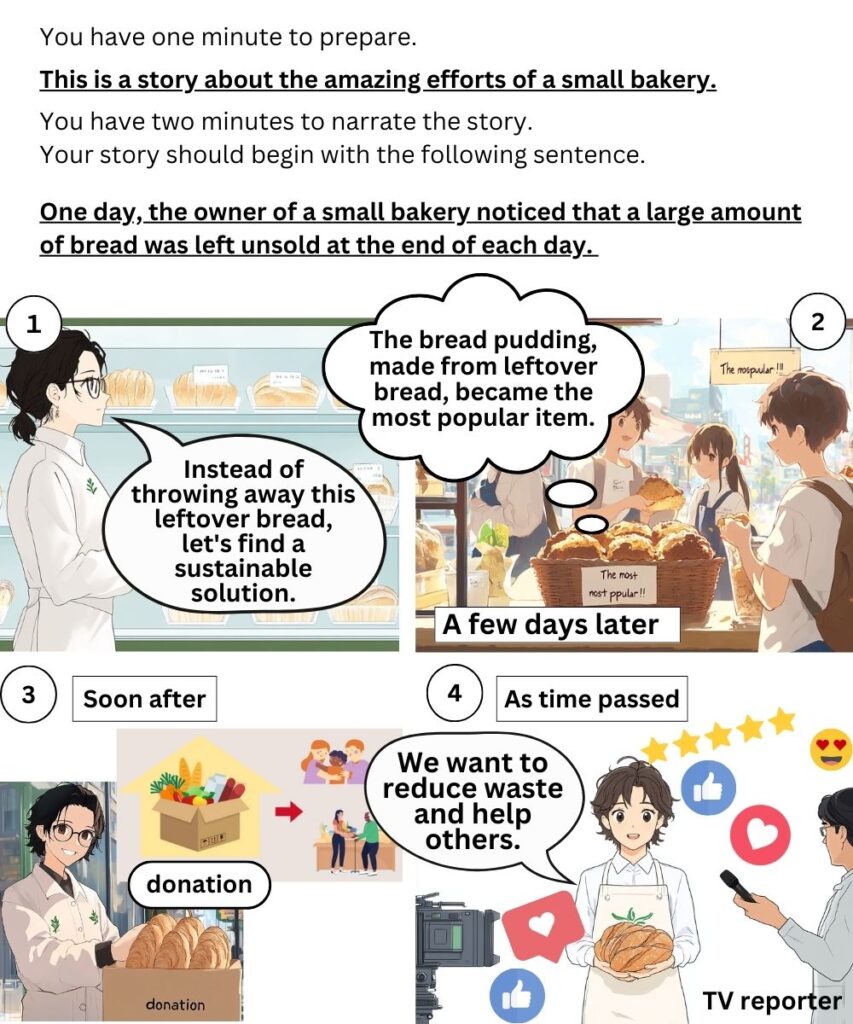実際の出題形式(問題カード)で英検準1級の面接練習を独学できるページです。
2024年度リニューアル対応!
所要時間:概ね8分
目次
- 1 質問概要
- 2 問題カード
- 3 ナレーションと質問
- 4 質問音源チャレンジ
- 5 解答例
- 6 パン屋ジョーク
- 6.1 1. Why did the baker go to therapy? He had too much on his plate.
- 6.2 2. What does a baker give as a gift? A loaf of thanks!
- 6.3 3. Why did the doughnut go to the dentist? It needed a filling.
- 6.4 4. What kind of bread does a sneaky baker make? Sourdough, because it’s always on the down-low.
- 6.5 5. What did the bread say to the baker? Don’t loaf around!
質問概要
ナレーション内容を考える(1分間)
イラストの内容を説明するナレーションを考える
ナレーション(2分間):ナレーションを始める
※2分以上続く場合は、途中でも中止させられるので注意
Q&A(No. 1):イラスト関連の質問
イラストに関連した質問。「問題カード」を見ながら解答できます。
※登場人物が考えている事などを聞かれます。
Q&A(No.2, No. 3)
問題カードに関連した、受験者の意見を問う質問
Q&A(No. 4)
問題カードのトピックに少し関係のある質問。受験者の意見を問う質問
※この<No. 4>質問文に「導入文」が追加されました。
問題カード

ナレーションと質問
ナレーション指示
<指示>Look at the pictures carefully and read the directions silently for one minute.(1分間)
<指示>Now, please begin your narration.(2分間)
Question No.1
Please look at the first picture. If you were the bakery owner, what would you be thinking?
Question No.2
Do you think donating unsold products to charities is a good practice for businesses?
Question No. 3
Do you think other shops could benefit from using leftover products to create new items like the bakery owner did?
Question No.4
More people are watching movies on smartphones or computers. Do you think movie theaters will disappear in the future?
質問音源チャレンジ
本番のように、英語の質問を聞いて答える練習をしてみましょう。
ナレーション準備
ナレーション開始
Question 1 mp3
Question 2 mp3
Question 3 mp3
Question 4 mp3
解答例
ナレーション例
<1> One day, the owner of a small bakery noticed that a large amount of bread was left unsold at the end of each day. Concerned about the waste, she decided to find a sustainable solution instead of simply throwing the leftover bread away.
ある日、小さなパン屋のオーナーは、毎日大量のパンが売れ残っていることに気づいた。廃棄物を心配した彼女は、残ったパンを単に捨てるのではなく、持続可能な解決策を見つけることに決めました。
「ただ単に = simply」の他の言い方も覚えておこう!
just, merely, only, purely, solely
<2> A few days later, she came up with the idea of making bread pudding using the unsold bread. When she introduced it to his customers, the bread pudding quickly became the most popular item in the bakery, attracting even more customers.
数日後、売れ残ったパンを使って「パンプディング」を作るというアイデアを思いついた。お客様に提供すると、このパンプディングはすぐにパン屋で最も人気のある商品となり、さらに多くのお客様を引き寄せた。
「bread pudding」は、パンを使って作るデザートの一種で、通常、残ったパンをミルクや卵、砂糖などと混ぜてオーブンで焼き上げる料理だよ。パンがしっとりとした食感になり、カスタードのような風味が特徴。特に、古くなったパンや売れ残ったパンを無駄なく利用するために作られることが多く、甘くて美味しい伝統的な家庭料理やで。
<3> Soon after, the owner thought of another way to contribute to the community. She decided to donate any remaining bread to local charities, ensuring that the food would go to people in need instead of being wasted.
その後すぐに、オーナーは地域社会に貢献する別の方法を考えた。彼は、残ったパンを地元の慈善団体に寄付することに決め、食べ物が無駄にならず、必要としている人々の元へ届くようにした。
「売れ残りのパン」や「残ったパン」を表す英語表現として、以下のような言い方があるよ、
Leftover bread – 残ったパン
Unsold bread – 売れ残りのパン
Surplus bread – 余剰のパン、余ったパン
Remaining bread – 残りのパン
Excess bread – 余分なパン
「売れ残ったパン」を強調したい場合は「unsold bread」や「surplus bread」、「残り物として残ったパン」を指す場合は「leftover bread」や「remaining bread」が適しているよ。
<4> As time passed, the bakery became well-known not only for its delicious bread pudding but also for its commitment to reducing waste and helping others. The owner’s efforts were even recognized by a TV reporter, bringing more positive attention to the bakery and its mission to make a difference. (170 words)
時間が経つにつれて、パン屋は美味しいパンプディングだけでなく、廃棄物削減と地域貢献への取り組みでも有名になった。その努力はテレビのレポーターにも取り上げられ、パン屋とその使命にさらなる注目が集まった。
Question 1 解答例
質問:1枚目の写真をご覧ください。あなたがパン屋のオーナーだったら、何を考えますか?
If I were the bakery owner, I would be thinking about how to minimize the amount of leftover bread. I might consider analyzing sales data to understand which types of bread are selling well and which are not, so I can adjust production accordingly.
もし私がベーカリーのオーナーだったら、パンの売れ残りを最小限にする方法を考えると思います。売れているパンと売れていないパンのデータを分析し、それに基づいて生産量を調整することを検討するかもしれません
「accordingly = それに応じて」「それに従って」「それを考慮して」という意味で、今回は「売上データの分析結果に基づいて生産を調整する」ということを指しているね。
他にもこんな表現があるよ:
As a result – 「その結果」
“…so I can adjust production as a result.”
In response – 「それに応じて」
“…so I can adjust production in response.”
According to the analysis – 「分析に従って」
“…so I can adjust production according to the analysis.”
Appropriately – 「適切に」
“…so I can adjust production appropriately.”
Correspondingly – 「それに応じて」
“…so I can adjust production correspondingly.”
Question 2 解答例
売れ残った商品を慈善団体に寄付することは企業にとって良い習慣だと思いますか?
Yes, I think donating unsold products to charities is a good practice because it helps reduce waste and supports people in need. It can also improve a business’s reputation in the community.
はい、売れ残った商品を慈善団体に寄付することは、廃棄物を減らし、困っている人々を支援する良い取り組みだと思います。さらに、地域社会での企業の評判も向上させることができます
No, I think businesses should focus on selling their products rather than donating them. While it’s important to help others, the primary goal of a business is to make a profit, and giving away products might not be sustainable in the long term.
いいえ、企業は寄付よりも商品の販売に集中すべきだと思います。他者を助けることは重要ですが、企業の主な目標は利益を上げることであり、商品を無償で提供することは長期的には持続可能ではないかもしれません
Question 3 解答例
パン屋のオーナーがしたように、他のショップも、余った商品を使って新しい商品を作ることで、恩恵を受けることができると思いますか?
Yes, I think other shops could benefit from using leftover products to create new items because it reduces waste and can lead to the creation of popular new products. This approach can also attract more customers who appreciate sustainability.
はい、他の店舗も、ベーカリーオーナーのように残り物を活用して新しい商品を作ることで、廃棄物を減らし、人気の新商品を生み出すことができるので、利益を得られると思います。また、このような取り組みは、持続可能性を重視する顧客を引きつけることができます。
No, some industries may not be able to use leftover products effectively, and it might be more practical and sustainable to develop systems that prevent leftovers from being created in the first place.
いいえ、業種によっては、売れ残りを効果的に活用できない場合もありますし、そもそも売れ残りが出ない仕組みを考える方が、より実用的でサステナブルだと思います
Question 4 解答例
スマートフォンやパソコンで映画を見る人が増えています。今後、映画館はなくなると思いますか?
Yes, I think movie theaters might disappear in the future as technology continues to improve and more people prefer the convenience of watching movies at home. Streaming services offer a wide variety of movies, and it’s often cheaper and more comfortable to watch them from home.
はい、技術が進化し、より多くの人々が自宅で映画を観る便利さを好むようになれば、将来的に映画館がなくなる可能性があると思います。ストリーミングサービスは豊富な映画のラインアップを提供しており、家から観る方が安くて快適なことが多いです
No, I don’t think movie theaters will disappear because they offer a unique experience that can’t be replicated at home. The big screen, immersive sound, and social aspect of going to the movies are things that many people still value and enjoy.
いいえ、映画館はなくならないと思います。映画館は、自宅では再現できない独特の体験を提供しているからです。大画面、没入感のある音響、そして映画を観に行くという社会的な要素は、多くの人々がいまだに価値を感じ、楽しんでいるものです。
面接練習はask本校にお尋ねください:無料体験レッスン予約
こちらの投稿もおススメです:英検準1級面接問題カード|在宅勤務トピック質問と回答例
パン屋ジョーク
1. Why did the baker go to therapy? He had too much on his plate.
なぜパン屋はセラピーに行ったの?
彼には「やることが多すぎた」からさ
解説:
このジョークは「have too much on one’s plate」という英語のイディオムを使っています。この表現は、「やることが多すぎる」という意味ですが、「plate(お皿)」はパン屋が食べ物を扱う仕事にも関連していて、二重の意味が生まれています。
2. What does a baker give as a gift? A loaf of thanks!
パン屋は何をプレゼントするの?
「感謝のローフ(パン)」!
解説:
このジョークは、「a loaf of bread(パン一斤)」と「a lot of thanks(たくさんの感謝)」を掛け合わせています。「Loaf」という言葉が、感謝の気持ちを表すフレーズにユーモアを加えています。
3. Why did the doughnut go to the dentist? It needed a filling.
どうしてドーナツは歯医者に行ったの?
詰め物が必要だったから。
解説:
「filling」という言葉は、ドーナツの中身(クリームなど)を指すこともできれば、歯の治療における「詰め物」も意味します。このダブルミーニングがジョークのポイントです。
4. What kind of bread does a sneaky baker make? Sourdough, because it’s always on the down-low.
こそこそするパン屋が作るパンは何?
サワードウ、「静かに進める(on the down-low)」から。
解説:
「on the down-low」という表現は、「こっそりと」「内密に」という意味です。サワードウ(sourdough)は、「sour(酸っぱい)」と「low(低い)」という音の響きから、この表現を連想させるジョークになっています。
5. What did the bread say to the baker? Don’t loaf around!
パンがパン屋に言ったのは?
「だらけないで!」(loafには「だらける」の意味がある)
解説:
「loaf around」は「怠ける」という意味のフレーズですが、ここでは「loaf」という言葉がパン一斤を表すこともあり、パン屋とパンの関係におけるダブルミーニングとして使われています。




